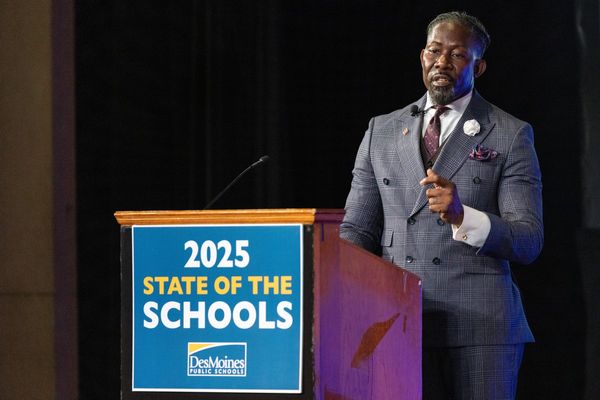
Olaf Scholz faces fresh scrutiny over allegations that he was responsible for waiving a multimillion-euro tax bill for a private bank involved in a tax fraud scheme, as the German chancellor struggles to shake off links to alleged local government sleaze from his stint as mayor of Hamburg.
On Tuesday it emerged that prosecutors investigating illegal so-called “cum-ex” trades have spent the last few months raking over Scholz’s emails from when he governed the prosperous northern city-state between 2011 and 2018.
On 19 August the Social Democratic party (SDP) politician will be dragged back in front of a Hamburg parliamentary committee to explain whether he held a protecting hand over a prestigious bank with financial pulling power in his home town, as well as his relationship to a party ally who had proactively lobbied for and later allegedly called in financial favours for his party from the same institution.
At the chancellor’s annual summer press conference on Thursday, Scholz again denied having politically influenced the process of waiving the tax bill.
At the heart of the allegations lies MM Warburg & Co, Germany’s oldest and largest private bank, headquartered a short walk from Hamburg’s town hall.
Between at least 2007 and 2011, Warburg practised cum-ex deals on a grand scale, trading shares at high speed on or just before the dividend record date – the day the company checks its records to identify shareholders – and then claiming two or more refunds for capital gains tax that had in fact been paid to the state only once.
Prosecutors allege the bank thus swindled the German state out of an estimated €300m.
The name refers to rapidly traded shares with (“cum”) and without (“ex”) dividend rights. Last year the German federal court of justice ruled that such schemes were and always had been criminal acts of tax evasion.
While Warburg is part of a long list of high-profile banks under the spotlight for allegedly practising or tolerating cum-ex trades – including Deutsche Bank, Commerzbank and the Bank of America subsidy Merrill Lynch – the Hamburg-based institution has been under special scrutiny because it featured heavily in the first German trials against the tax fraud scheme.

Last June a former Warburg executive was sentenced to five and a half years in prison for tax evasion, becoming the first banker to be jailed over the scandal. Paul Mora, a New Zealand citizen who was in charge of constructing cum-ex deals for Warburg from 2008, has been on Interpol’s list of most wanted criminals since being charged. The private lender’s former boss Christian Olearius was charged over serious tax evasion last month. He denies the charges.
This is where Scholz, the head of Germany’s three-party coalition government since last December, enters the picture. According to the Warburg boss’s seized diary, cited in court and leaked to the Süddeutsche Zeitung, Olearius met Hamburg’s then mayor twice over a two-week period in 2016 while the bank was already under investigation by financial authorities and faced having to pay back €47m in taxes.
Shortly after the meeting, Warburg was told by Hamburg authorities that it did not have to pay the bill after all – a decision partially revoked a year later by the federal finance ministry in Berlin.
When asked about the meeting by a parliamentary committee last year, Scholz said he could not remember the content of the conversation. He insisted he had given no “special treatment” to the banker, whose lending house plays a powerful role in Germany’s second largest city and played a part in rescuing the local shipping company Hapag-Lloyd from a sale in 2008.
Olearius’s diaries also note, however, that Scholz called him on his mobile two weeks later, asking him to send his legal reasoning for why his bank did not have to make the tax repayments to the then state finance minister, Peter Tschentscher.
Tschentscher, in turn, passed on the seven-page document to the relevant caseworker after annotating the bank’s defence in ministerial green ink – a clandestine bureaucratic code, Scholz’s critics allege – that urged authorities to adopt Warburg’s line of argument and meant, they claim, the mayor had managed to bail out the lender without leaving his fingerprints on the backroom deal.
The Hamburg authorities did not communicate their reasoning for waiving the bill publicly at the time, but minutes of meetings that have surfaced during the investigations show Hamburg financial authorities adopted the line of argument provided by the bank: that the legal basis for the tax repayments had not been firmly established, and that the repayment could have brought the important lender to potential collapse.
With no evidence of wrongdoing, however, these allegations did little to harm to Scholz’s victorious run for the chancellory, in spite of surfacing in the middle of last year’s election campaign. When a case worker in the Hamburg tax office told the investigative committee that she, rather than Tschentscher, had underlined key passages of the Warburg defence in green ink, it also seemed to weaken the chain of decisions linking the tax-waiver to Scholz.
The reason Scholz’s dealings with Warburg have come to the fore again this week has to do with a politician who allegedly acted as a go-between: Johannes Kahrs, an erstwhile Social Democrat MP from Hamburg and powerful player on the centre-left party’s conservative wing, who resigned from all his political posts unexpectedly in 2020.
Olearius’s diaries not only claim that Kahrs had set up the meeting between the banker and the mayor but that he asked the Warburg boss for donations to his party a year later. Companies with links to Olearius made two donations to the SPD’s central Hamburg branch in 2017 amounting to €45,500.
On Sunday the Bild newspaper reported that investigators had discovered €214,800 and $2,400 in cash inside a safe deposit box carrying Kahrs’s name as part of a raid on his property in September 2021, inviting new speculation about the goings-on between the Hamburg branch of the SPD and Warburg, although there is no evidence linking the money to either organisation. Olearius and the bank’s main shareholder Max Warburg Jr have denied they provided the cash found in the deposit box.
It is not known why Kahrs had the money in the safe deposit box, and he has declined to comment on the media reports.
Scholz’s pending second quizzing by Hamburg parliamentarians, as well as the October publication of a book by the investigative journalist Oliver Schröm throwing the spotlight on the chancellor’s role in the affair, The Scholz File, means Germany’s leader may not evade questions as easily as he did in 2021.
“The cum-ex affair is the chewing gum that keeps sticking to Scholz’s shoe,” Schröm told the Guardian. “Unless he finally finds a way to speak up about what happened, it could overshadow his spell at the chancellory.”
• This article was amended on 13 August 2022 to clarify that while Tschentscher made annotations in the Warburg defence document, it was a case worker who made the underlinings.







